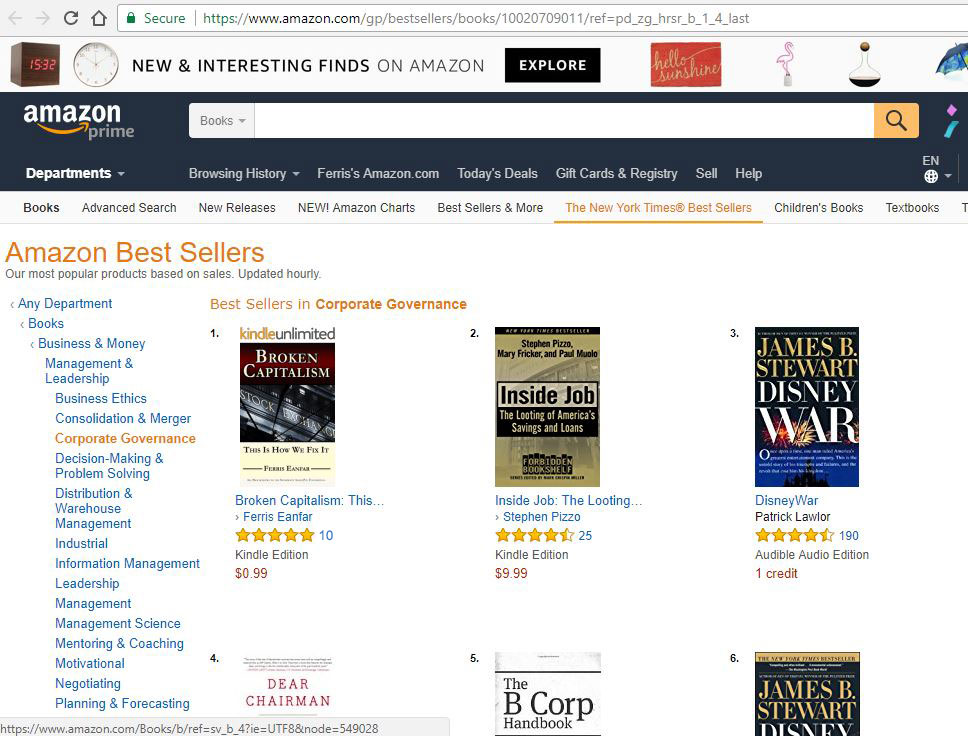How Do You Take Away a Citizen’s Rights Without Violating Their Rights? Trying to compel the U.S. Supreme Court to reduce or cap private campaign finance spending is a monumental waste of time and national resources. There is no logical or intellectually consistent way to ignore the deep, philosophical conundrum that has perplexed the Supreme Court and government policymakers in the United States since at least the time of President Andrew Jackson’s political patronage system in the 1830s. The conundrum is almost comical: How do you take away a person’s First Amendment right to free speech without violating his First Amendment right to free speech?
Rights Either Exist or Not; There is no Fraction of a Constitutional Right. This has been an unsolvable logical paradox for nearly two centuries in the United States because proponents of campaign finance reform are trying to accomplish an illogical goal. Regardless of the existence of various Federal Election Commission (“FEC”) laws that may exist now or in the future, from a purely logical and philosophical perspective, the government cannot legitimately pass a law to abridge a person’s constitutional right even by an incremental degree. A constitutionally protected right either exists or it does not exist; there is no fraction of a constitutional right.
The Ninth Amendment Protects Special Interest Spending in General. Unless a particular action performed by a person can be unequivocally proven to be harmful or hostile to another person’s enjoyment of his own constitutional rights, then the Ninth Amendment within the U.S. Bill of Rights restricts the government from abridging any person’s freedom to perform any activity that is otherwise legal. In a country that provides the constitutional protection of free speech and assembly, there’s no rational, non-paradoxical way to debate the specific issue of whether a government can prevent people from spending their money on election campaigns to support their favorite political candidates. This debate will always lead to a recursive, never-ending loop of subjective, emotionally-charged debate, which will never lead to a universally satisfying solution.
Disliking Something Doesn’t Make it Unlawful. Of course, I don’t like the way money distorts and corrupts the democratic process, which is why I wrote my books and many of the articles on this website, but just because I don’t like something doesn’t mean I think a government has the authority to pass paradoxical laws to block activities I don’t like. More importantly, there is a much more elegant, philosophically consistent, and politically viable way to avoid the eternal paradox of campaign finance reform, which is the purpose of The Platform.
Are Corporations People, Too?
Proponents of campaign finance reform often say things like, “OK, maybe a human being has a constitutional right to spend their money on elections, but that doesn’t mean corporations and SuperPACs have a constitutional right to spend hundreds of millions of dollars on elections.” The heart of this statement is rooted in another deep philosophical debate: Are corporations people, too? Let’s briefly explore some of the most important components of this question.
A Corporation is a Collection of Citizens. Many people seem to have a difficult time accepting that corporations can be classified as “legal persons” under the law. Business people, lawyers and judges don’t literally believe a corporation is a human person, but they rationally understand that a corporation is merely a legal idea that is logically wrapped around a collection of human beings at all times. The idea of a corporation is merely a logical mental container in which people, money and other resources dwell. It is the unified expression of all the human beings and resources within it.
Corporations Don’t Have Money Until People Put Money Into Them. The corporation has no money in it until humans consciously choose to put their money into a corporation in the form of paid-in capital, which is itself a constitutionally protected action. The corporation idea cannot do anything with that money by itself without the conscious motivations, intentions, choices and actions of the humans within it. So the corporation idea is just a logical and rational manifestation and extension of all the humans within it. They are the corporation; it is them.
Citizens Express Their Rights via the Corporation. As a result, the corporation itself is merely a mental construct, but all the people within the logical corporation container are fully entitled to their constitutionally protected rights. A collection of people should not have fewer rights in the aggregate than they do as individuals. The corporation is simply the collective expression of all the rights, desires, and activities that the people inside the corporate container want to perform within the scope of the corporation’s charter.
Spending Money is a Manifestation of Free Speech. The scope of the corporation’s charter may legally include many activities, including constitutionally protected free speech and assembly. Free speech logically includes the expression of speech in the form of financial donations to any political campaign that the humans within the corporation would choose to donate to themselves, even if they didn’t have the corporation container wrapped around them. The corporation’s speech is the speech of its shareholders, as long as executive management is speaking on behalf of a majority of the corporation’s shareholders. (More on this later.)
A Logical Example. If you’re still not convinced that it’s completely rational to extend a human being’s constitutional right of free speech to a corporation, a more concrete example may help. Let’s say there is a group of 100 people, each with $1 to donate to a particular political campaign. Logically, this group of people can donate to a political campaign in two ways: (1) they can all donate separately and mail one-hundred $1-checks to the political candidate’s campaign; or (2) all 100 people can pool their funds into a single corporation container and mail a single $100-check to the candidate’s campaign. In both cases, the candidate received the same amount of money and in both cases the donors were expressing their constitutional rights to free speech and assembly. The amount of money and the presence of the corporation in the middle of those transactions do not change the fact that they all want to assemble and express their free speech through the logical container of a corporation.
A Corporation’s Speech Must Reflect the Will of its Shareholders to Receive First Amendment Protection. This is the fundamental fulcrum point around which this entire discussion hinges: If senior executives and board members use a corporation’s money against the the wishes of a majority of its shareholders, then and only then should the corporation’s speech be restricted. For example, let’s say BigCompany spends $10 million on SuperPAC political attack ads that a majority of its shareholders do not agree with; that would be a violation of the corporation’s legal obligation to perform according to the will of its shareholders. At that point, the executive management and board members responsible for that violation should be held accountable by their shareholders. Thus, this is a corporate governance problem, not a campaign finance or First Amendment problem. (There are other interesting nuances to this issue, which I may write about in another article.)
The Slippery Slope of Arbitrary Justice
Attempting to restrict an individual’s constitutional rights for any reason is a slippery slope, which Supreme Court judges have been trying to avoid slipping on for many decades. As the table below illustrates, this is why the campaign finance reform pendulum swings back and forth every few years depending on who happens to be sitting in the Supreme Court, the White House, Congress, and the mood of the general public. With all due respect to the gravity of this problem, the campaign finance reform debate and the circus that surrounds it is just a glorified political soap opera that few citizens can appreciate, let alone understand.
| Year | Case | Overall Verdict | Vote |
| 1976 | Buckley v. Valeo | No caps on campaign, personal, or 3rd-party spending. | 5-3 |
| 2007 | Wisconsin Right to Life v. FEC | Gov. can’t prohibit PAC ads before election. | 5-4 |
| 2008 | FEC v. Davis | Gov. imposes funding limits on opponents of self-funded candidates. | 5-4 |
| 2010 | Citizens United v. FEC | No limits on PACs or corps. | 5-4 |
| 2011 | Arizona Free Enterprise Club’s Freedom PAC v. Bennett | Public financing systems can’t grant matching funds to compete with citizens. | 5-4 |
| 2012 | Speechnow.org v. FEC | No caps on source & size of donations. | N/A |
| 2014 | McCutcheon v. FEC | No caps on donor aggregate spending across campaigns. | 5-4 |
The Solution is Accountability & Transparency, Not Spending Restrictions. If a society gives a corporation the same constitutional rights and protections that the society gives to its citizens because the corporation is the logical extension of the collective rights, liberties, obligations, desires, and expressions of the human owners of the corporation, is it also logical for society to impose the same expectation of ethical and socially-conscious behavior on the corporation as it does on the humans it represents? If there is a need for federal legislation to reign in abuses of corporate power, this is likely the only area where it is constitutionally and ethically feasible. This question has profound implications, which I will explore more deeply in another article.
The Paradox Will Become an Irrelevant Sideshow. The Platform fundamentally cuts the umbilical cord between special interest donors and elected officials. When that happens, the campaign finance reform circus, the emotionally-charged existential debate about whether corporations are people or not, and all the private money flowing into politics, will all become irrelevant sideshows. In fact, it doesn’t matter how much money flows into the political system if the incentives of the politicians that are elected no longer need to depend on special interest money or taxpayer-subsidized government largess.
About Ferris Eanfar
Ferris Eanfar has over 20 years of experience in technical, financial, media, and government intelligence environments. He has written dozens of articles and several books in the fields of Economics, Crypto-Economics, and International Political Economy, including Broken Capitalism: This Is How We Fix It and GINI: Capitalism, Cryptocurrencies & the Battle for Human Rights and the Global Governance Scorecard. Ferris is a cofounder of the Gini Foundation, which builds unique cryptocurrency systems to protect human rights, among other benefits; and the CEO of the AngelPay Foundation, a nonprofit financial services company with a mission to “return wealth and power to the creators of value.” To learn more about Ferris, please visit the About Ferris page.Visit Ferris on:

 Gini Website Coming Soon. We (
Gini Website Coming Soon. We (
